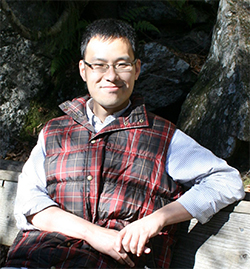温 泉
 | Name: | Quan Wen(温泉) |
| Address: | Principal Investigator, School of Life Sciences | |
| University of Science and Technology of China | ||
| 443 HuangShan Rd, Hefei, Anhui, P. R. China | ||
| Website: | http://www.wenlab.org/ | |
| E-mail: | qwen@ustc.edu.cn |
| EDUCATION AND RESEARCH EXPERIENCE |
1997-2001 | B.S. in physics, Fudan University |
2001-2007 | Ph.D in physics, Stony Brook University and Cold Spring Harbor Laboratory |
2007-2009 | Associate, Janelia Farm Research Campus, HHMI |
2009-2013 | Postdoc, Department of Physics, Harvard University |
2014- | Bairen Professor, USTC |
| RESEARCH INTERESTS |
1. | Neural basis of sensorimotor behavior and optical neurophysiology |
2. | Structure-function relationship of neural circuit |
3. | Connectomics |
| DESCRIPTION |
| We are interested in understanding how collective activities in a neural circuit give rise to complex behaviors. To address this question, we strive to precisely describe the behavior of interest, to identify the neural computations that drive such behavior, and to elucidate the underlying biophysical mechanisms by which neurons and synapses implement such computations. At current stage, we focus on using C. elegans as a model system to study the neural basis of sensorimotor behaviors. This millimeter long, optically translucent roundworm has only 302 neurons, for which the entire wiring diagram or connectome has been mapped out at synaptic resolution. Its genetic tractability also allows physiological access to virtually every neuron using optical methods. These advantages hold the promise of a deep understanding of sensorimotor transformation at both algorithmic and mechanistic levels. |
| REPRESENTATIVE PUBLICATIONS |
1. | Luo L*, Wen Q*, Ren J*, Hendricks M*, Gershow M, Qin Y, Greenwood J, Soucy E, Klein M, Smith H.K, Colon-Ramos D, Samuel ADT, Zhang Y, Dynamic encoding of perception, memory and movement in a C. elegans chemotaxis circuit, Neuron 82, 1115-1128, June 4, 2014. *Co-first author. |
2. | Wen Q, A statistical theory of dendritic morphology, book chapter in The computing dendrite, from structure to function. Springer Series in Computational Neuroscience, Vol. 11, 2014. |
3. | Williams D, Bejjani R, Ramirez PM, Coakley S, AeKim S, Lee H, Wen Q, Samuel ADT, Lu H, Hilliard M and Hammarlund M, Rapid and permanent neuronal inactivation in vivo via subcellular generation of reactive oxygen with the use of killerRed, Cell Reports 2013;5:553-563. |
4. | Wen Q*, Po M, Hulme E, Chen S, Liu X, Gershow M, Leifer A, Butler V, Fang-Yen C, Schafer W, Whitesides G, Wyart M, Chklovskii DB, Zhen M and Samuel ADT*, Proprioceptive couplings within motor neurons drive C. elegans forward locomotion Neuron 76, 750–761, November 21, 2012. *Corresponding author. Also see Preview in Neuron 76, 669-670, 2012 and http://f1000.com/prime/717967919, rated as exceptional. |
5. | Fang-Yen C, Wyart M, Xie J, Kawai R, Kodger T, Chen S, Wen Q and Samuel ADT Biomechanical analysis of gait adaptation in the nematode Caenorhabditis elegans, PNAS, 2010 Nov 23, 107(47) 20323-28 |
6. | Makara J, Losonczy A, Wen Q and Magee J, Experience-dependent compartmentalized dendritic plasticity in rat hippocampal CA1 pyramidal neurons, Nature Neuroscience, 2009 Dec;12(12):1485-7. |
7. | Wen Q, Stepanyants A, Elston G, Grosberg A and Chklovskii DB, Maximizing the connectivity repertoire as a statistical principle governing the dendritic arbor shape, PNAS, 2009 Jul 28;106(30):12536-41. Also see http://f1000.com/1163141#eval623810. |
8. | Wen Q and Chklovskii DB, A cost-benefit analysis of neuronal morphology, Journal of Neurophysiology, 99, 2320 (May, 2008) |
9. | Wen Q and Chklovskii DB, Segregation of the brain into gray and white matter: a design minimizing conduction delays PloS Computational Biology, 1(7): e78, Dec 2005. Also see article Highways and byways in the brain. Seed magazine, January 31, 2006. |
10. | Wen Q and Chklovskii DB, To myelinate or not to myelinate, a cost-benefit analysis Book chapter in Axons: Advances in morphology, physiology, development, computation and pathophysiology (Springer, Norwell MA 02061, U.S.A.) |
相关文章
- 中国科大阐明秀丽隐杆线虫产生稳健而灵活运动的神经环路机制和算法2020-06-16 23:49:20
- 中国科大阐明秀丽隐杆线虫运动控制的重要规则2018-05-04 01:12:38

